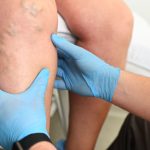What are turbinates?
The turbinates (or nasal concha) are bony shelves in your nose covered by glandular tissue rich in blood vessels and nerves.
The turbinates help to regulate the flow of air through your nose.
The inferior turbinates can sometimes permanently enlarge and block your nose.
What are the benefits of surgery?
You should get relief from a blocked nose.

Are there any alternatives to surgery?
If your turbinates are enlarged because of rhinitis, your doctor may be able to give you steroid nasal sprays, decongestants or antihistamines to improve your symptoms of a blocked nose.
Surgery is recommended only if medication has not worked.
What does the operation involve?
The operation is performed through your nostrils and does not result in any facial scars or black eyes.
The operation is usually performed under a general anaesthetic but a local anaesthetic can be used. The operation usually takes 15 to 30 minutes.
Reducing the size of the turbinates usually involves one of the following techniques.
- Diathermy – Passing an electric current through a needle placed either on the surface of the turbinate or inside the tissue.
- Trimming – Cutting away the lower or outer part of the turbinate. This may also involve removing some of the turbinate bone and rolling some of the remaining tissue over the raw area.
Your surgeon may place some packing in your nose to prevent bleeding.
How can I prepare myself for the operation?
If you smoke, stopping smoking now may reduce your risk of developing complications and will improve your long-term health.
Smoking stops your nose clearing mucus properly and this can increase the feeling of a blocked nose.
Try to maintain a healthy weight. You have a higher risk of developing complications if you are overweight.
Regular exercise should help to prepare you for the operation, help you to recover and improve your long-term health. Before you start exercising, ask the healthcare team or your GP for advice.
Speak to the healthcare team about any vaccinations you might need to reduce your risk of serious illness while you recover. When you come into hospital, practise hand washing and wear a face covering when asked.
What complications can happen?
Some complications can be serious and can even cause death.
General complications of any operation
- bleeding
- infection of the surgical site (wound)
- allergic reaction to the equipment, materials or medication
- venous thromboembolism (VTE)
- chest infection
Specific complications of this operation
- scar tissue connecting the turbinate to your septum
- crusting in your nose
- increased nasal discharge
- atrophic rhinitis, if too much tissue is removed
- toxic shock syndrome, which is an infection of your bloodstream
- damage to your tear duct
Consequences of this procedure
- pain
How soon will I recover?
You should be able to go home the same day.
If you had non-dissolvable packing in your nose, you will need to stay overnight and the packing will be removed the next morning.
You will need to stay off work and away from groups of people for 2 weeks. This is to avoid catching a cold, which could result in an infection.
Regular exercise should help you to return to normal activities as soon as possible. Before you start exercising, ask the healthcare team or your GP for advice.
Most people make a full recovery and can return to normal activities.



